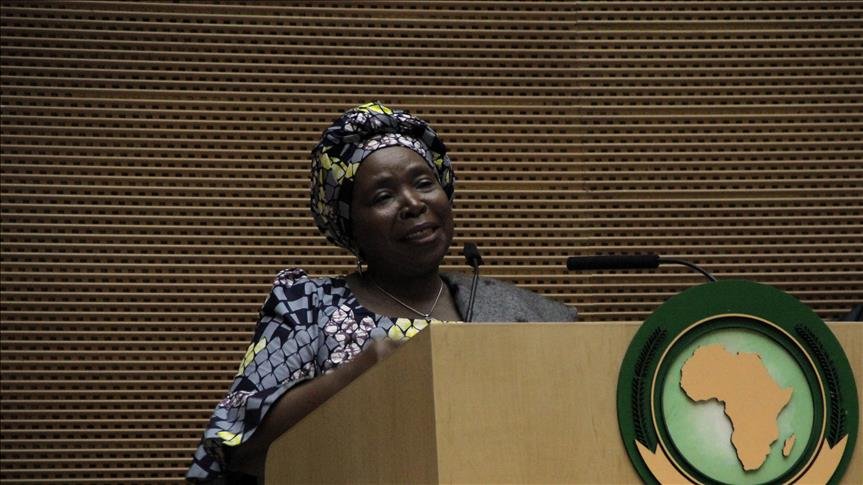Growing unrest, violence attracts attention of African Union, US
By Addis Getachew
ADDIS ABABA, Ethiopia
A recent statement of concern by the African Union has thrown the spotlight onto what many see as a simmering problem in Ethiopia which — if left unaddressed — could rapidly descend into a nationwide crisis.
AU Commission chief Nkosazana Dlamini-Zuma last week called for what she described as “a high-level of restraint” amid growing unrest.
And on Sunday, U.S. ambassador to the United Nations — leading a high-level delegation to Juba, South Sudan and Addis Ababa — raised concerns about excessive use of force.
In Ethiopia, conflicts between anti-government demonstrators and the security forces have been a usual sight and have been increasing in intensity since November last year.
The conflict began with popular opposition to a city expansion plan in the capital, Addis Ababa, which encroached upon farmland. The scheme never materialized but the anti-government demonstrations continued.
On another front, a tribal community near the border with Sudan in northwest Ethiopia began protests for recognition of their ethnic identity, demanding they be removed from the jurisdiction of the northern Tigray State.
The Amhara protests expanded quickly into many other counties.
Tensions continue unabated. In several areas of Oromia, anti-government demonstrations continue with people making a trademark gesture of protest — raised arms crossed in an “X” sign.
This sign has been shown to the world by the likes of famous athletes such as runner Feyisa Lilesa who recently won silver at the Rio Olympics. Two more Ethiopian athletes have repeated the gesture in international competitions.
Rising tensions
Over the past month, the anti-government demonstrations have become intense and more frequent. In the resort lakeside city of Bahir Dar, capital of the Amhara regional state, 551 kilometers (342 miles) northwest of Addis Ababa, one resident — speaking anonymously — told Anadolu Agency she had not left home for weeks.
“All businesses were closed during the stay-at-home protest in Bahir Dar,” she said in a telephone interview. It was not until last Friday that some residents were able to go out and shop for essentials.
According to her, on some days it would look peaceful, with no demonstrations or strikes, but on others tensions would quickly escalate with gunshots being heard.
According to Human Rights Watch, more than 500 people have been killed by the security forces since November 2015. The government, however, insists that it will conduct an independent investigation.
Chane Kebede, the president of the opposition Ethiopian Democratic Party (EDP) told Anadolu Agency: “The country is at the crossroads and the ruling party should drastically change the ways of its rule and kickstart a fresh process of all-inclusive transition.
“That should usher in a whole process of national reconciliation. It is the only viable way left for this country to bring itself together and move forward on a democratic path.”
Asked why national reconciliation was needed, Kebede said: “This government ruled for the past 25 years by capitalizing on our differences, rather than fostering unity.”
“All that should change. The people now are asking for more unity, not discord. The government should listen to popular demands,” he added.
Last month, the ruling Ethiopian People’s Revolutionary Democratic Front — in power since 1991 — held an extraordinary executive committee meeting. “We deliberated on the current situation openly and agreed to embark upon reform measures,” Prime Minister Hailemariam Desalegn told state media.
However, according to Kebede “the root causes are accumulated grievances of people due to a lack of good governance, corruption and economic deprivation”.
Asked what will happen if things go on like this, Kebede said the country might disintegrate. “Now it all hinges on the will of the government to look within itself and face up to the challenge.”
Prison fire
Last Saturday, a remand prison in the eastern outskirts of the city of Addis Ababa — known to be a holding point for jailed dissidents and opposition figures — caught fire.
It took two days for the government to give details; 23 people died in the fire and two more were shot “while trying to escape the prison” according to the authorities.
The cause of the blaze has not been determined but state news agency ENA on Thursday reported that the government will soon release the identities of those who died.
Rumors are rife that the fire was a cover-up after the security forces opened fire on prisoners. The claims have yet to be verified or confirmed independently.
One thing is apparent — families of the inmates are going public with fears for their loved ones.
“Why should the government deny families of the prisoners required access to see their loved ones after the fire,” an Ethiopian independent journalist — speaking anonymously due to safety concerns — asked Anadolu Agency.
“If the likes of Bekele Gerba [a well-known opposition figure] are confirmed killed…it will set a very, very bad precedent and may entail public uproar,” he said.
For EDP leader Kebede Chane, the “uprisings are set to continue until the people’s demands for social justice is answered”.
Source: Anadolu Agency


























